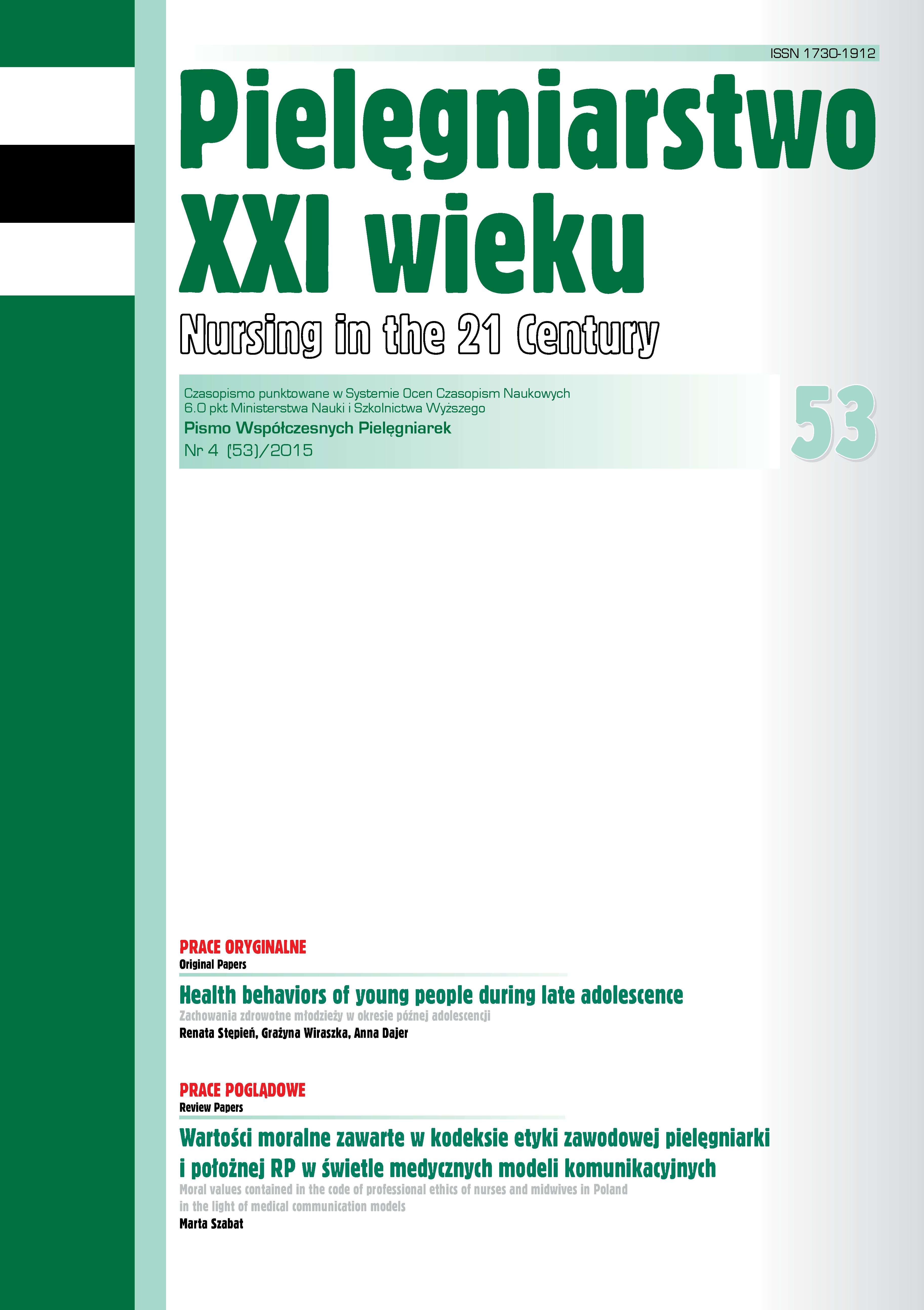The attitudes of parents towards children with cerebral palsy
DOI:
https://doi.org/10.12923/p21w-2015-4/46Keywords:
parental attitude, cerebral palsyAbstract
THE ATTITUDES OF PARENTS TOWARDS CHILDREN WITH CEREBRAL PALSY
Introduction. Cerebral palsy (CP) can be regarded as a complex group of disorders, as well as a diagnostic, therapeutic and social issue which may influence the occurrence of abnormal parental attitude that deranges child development.
Aim. Obtaining the knowledge about parents’ attitudes toward children with cerebral palsy and the factors which may be related to their development.
Material and methods. 71 parents of children with CP . The authors used two questionnaires assessing the parents’ attitudes – one questionnaire prepared by M. Ziemska and the other prepared by the authors . The statistical analysis was performed using Chi-squared test, Student’s t-test and Wilcoxon signed-rank test.
Results. The majority of parents have abnormal parental attitude towards their children. In the helplessness scale, irrespective of age of the child, parents scored moderate rating – for children 4-6y.o. 6.08 ± 2.47; 7-12 y.o. 5.56 ± 2.92; >12y.o. 6.00 ±1.00 – all with p<0.05. The statistically significant relationship between the age of a child and fathers’ dominating attitude in children over 12 y.o. was confirmed (over 8.33 in sten score).
Conclusion. Fathers might start to feel helpless, since they are mostly responsible for providing the family with money, while it is the mothers that spend most of the time with children. The increase of domination attitude along with parents’ age can be caused by long-term care giving exhaustion.
References
1. Parchomiuk M. Poczucie koherencji i wsparcie społeczne a stres wychowania dziecka z niepełnosprawnością. Niepełnosprawność Rehabil. 2009; 2: 3-23.
2. Baleja-Stawicka I, Rabe-Jabłońska J. Stan psychiczny i jakość życia matek opiekujących się dziećmi z upośledzeniem umysłowym jako czynniki wpływające na jakość opieki – przegląd piśmiennictwa. Psychiatr. Psychol. Klin. 2007; 7(3): 165-169.
3. Ziemska M. Postawy rodzicielskie. Wyd. II. Warszawa: Wiedza Powszechna; 1973.
4. Parchomiuk M. Rodzice dzieci z mózgowym porażeniem dziecięcym wobec sytuacji trudnych. Lublin: Wyd. Uniwersytetu Marii Curie – Skłodowskiej; 2007.
5. Sikorski W. Postawy rodzicielskie w percepcji dorastających dzieci a poziom ich aspiracji edukacyjnych. Psychol Wychow. 2000; 2/3: 190-200.
6. Plopa M. Psychologia rodziny. Teorie i badania. Kraków: Oficyna Wydawnicza Impuls; 2005.
7. Wiśniewska E, Kułak W. Psychospołeczne funkcjonowanie rodziny z dzieckiem z mózgowym porażeniem dziecięcym. Przegl. Pediatr. 2010; 40(4): 218-225.
8. Parchomiuk M. Zasoby osobiste matek dzieci niepełnosprawnych. Człowiek-Niepełnosprawność-Społeczeństwo. 2012; 1(15): 43-62.
9. Płotka A, Antosz M, Płachecka L, Pawłowska B. Rodzice dziecka z mózgowym porażeniem dziecięcym. Pielęg. Położ. 2004; 8: 4-10.
10. Sadowska L, Szpich E, Wójtowicz D, i wsp. Odpowiedzialność rodzicielska w procesie rozwoju dziecka niepełnosprawnego. Przegląd Medyczny Uniwersytetu Rzeszowskiego. 2006; 1: 11-21.
Downloads
Published
Issue
Section
License
Copyright (c) 2015 Beata Ewa Zych, Grażyna Cepuch (Autor)

This work is licensed under a Creative Commons Attribution 4.0 International License.




